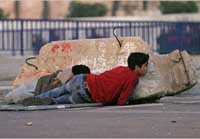Students return to Lebanese university where riot began that killed four
Several hundred police and soldiers ringed the campus of Beirut Arab University on Monday as students returned to classes for the first time since a political spat in the cafeteria mushroomed into street riots that killed four people and inflamed Sunni-Shiite tensions.

Campus security guards searched all students at the entrance and denied access to those without student IDs. Troops in armored personnel carriers and police officers watched the students arrive in a show of force meant to deter troublemakers.
The clashes of Jan. 25, which quickly spread from the campus to the streets of Tarik el-Jadideh district and beyond, was the worst case of sectarian violence since the 1975-90 civil war. Muslim Sunnis fought Muslim Shiites with rocks, sticks and even guns, leaving four people dead and dozens injured. Scores of cars were trashed and some were set ablaze.
In the evening, the army imposed a rare nighttime curfew and leaders of both communities appealed to their supporters to withdraw from the streets.
Fearing more violence, the authorities took advantage of a Shiite religious holiday to close all schools and universities through Jan. 31. Only the Beirut Arab University and the state-run Lebanese University were ordered closed until Monday.
The head of student affairs at Beirut Arab University, Hassan Dalati, said that attendance on Monday was "almost normal and hopefully it will be a day just like any other."
"If there were intentions to escalate things, the attendance would not have been so high," he said.
He said the heavy security measures were warranted. "We cannot afford to let something like this happen again," he said.
He said the Jan. 25 clash expanded so quickly because the students called for outside help.
Qassem Dirani, 22, an architecture student, said the campus atmosphere was "still charged" and that lecturers were repeatedly asking students not to discuss politics.
"I am trying to pretend that nothing happened, but it's hard. A lot of my colleagues are thinking of leaving the university and finishing their studies somewhere else," Dirani said Monday.
At the Lebanese University, attendance was "more than normal" Monday, said the university's president, Zuheir Shukur.
Riots did not take place on the campus on Jan. 25, but the university was closed for 10 days because its students have a reputation for being highly involved in politics.
"We stressed the importance of saving the academic year," Shukur told The Associated Press, adding that he had urged students to leave their political feelings outside the university.
Security at the university's campuses was tight, with security searching students as they entered and troops standing guard outside, ready to intervene.
The universities reopened despite the stalemate between the government and the opposition, with mediation efforts failing to bridge the divide, reports AP.
The Hezbollah-led opposition wants the government of Prime Minister Fuad Saniora to resign to make way for a Cabinet in which Hezbollah and its allies would have a veto power.
Saniora, who is backed by a slim parliamentary majority and many foreign states such as France and the United States, has refused to step down.
The tension pits Sunnis, who largely back the government, against Shiites, who are led by Hezbollah and its allies. Christians are divided between the two groups.
Subscribe to Pravda.Ru Telegram channel, Facebook, RSS!

